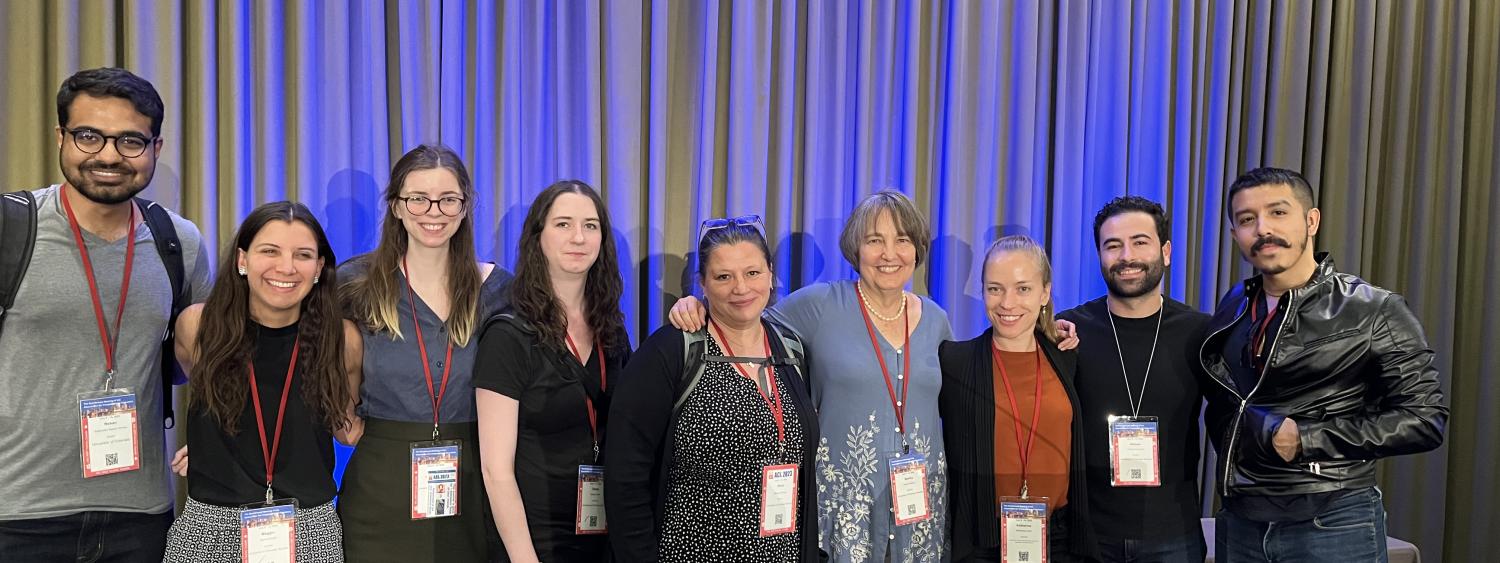 Caption: from left to right Rehan Ahmed, Margaret Perkoff, Elizabeth Spaulding, Skatje Myersm, Assistant Professor Alexis Palmer, Professor Martha Palmer, Assistant professor Katharina Kann, Abteen Ebrahimi, and Abhijnan Nath at the 2023 ACL conference.
Caption: from left to right Rehan Ahmed, Margaret Perkoff, Elizabeth Spaulding, Skatje Myersm, Assistant Professor Alexis Palmer, Professor Martha Palmer, Assistant professor Katharina Kann, Abteen Ebrahimi, and Abhijnan Nath at the 2023 ACL conference.
Professor of computer science and linguistics and Institute of Cognitive Science Faculty Fellow Martha Palmer was presented with the Association for Computational Linguistics' (ACL) 2023 Lifetime Achievement award for her contributions to the field over the past 50 years.
"It's really an honor,” Palmer said. “Aravind Joshi was a longtime chair of computer science at the University of Pennsylvania, and he was just a wonderful mentor to me. He was the first Lifetime Achievement award winner 20 years ago, and it feels really special to follow in his footsteps; I'm just thrilled."
Palmer was previously president of the ACL in 2005 and was recognized as an ACL fellow in 2014. Her focus has been on natural language processing and understanding, often called NLP. NLP works to make sense of how we transfer meaning to other humans through human languages such as Mandarin, English or American Sign Language.
Always seeking abstraction
Palmer said she has always been interested in how we can represent the meaning behind natural language in a repeatable, abstract way.
"I was just fascinated by the idea of trying to model how people think on the computer," Palmer said.
As an undergraduate student at the University of Texas (UT), Palmer majored in philosophy. This combination of meaning and structure gave her unique insight into how mathematical representation could describe natural languages more simply.
As a master's student at UT, Palmer worked under Robert Simmons and, in 1972, received an MA in computer science and psychology. It was the first multidisciplinary MA the university ever granted. Simmons, Palmer said, was considered one of the fathers of semantics nets, a key building block for artificial intelligence.
As Palmer decided where to pursue her PhD in the late 1970s, she wanted to use the newly formed field of artificial intelligence to help students understand mathematical proofs.
However, as is often the case, the funding available was for a different, related task. Palmer became a member of the first class of artificial intelligence PhDs at Edinburgh University, where she worked to break down word problems in physics into their underlying meanings.
Though Palmer said she learned a great deal, there were also odd limitations. If she wished to go to a pub with her male colleagues, they all had to file into the lady's lounge, as women weren’t allowed to enter the actual main pub room.
Palmer became the first woman to obtain a PhD in artificial intelligence from Edinburgh University in 1985.
She used her dissertation as the basis of a powerful NLP system, the Pundit system, for DARPA in the late 1980s. The system could accurately process telexes from Navy ships and identify subtle temporal and causal relationships.
Hooked on verbs
Over time, Palmer realized that verbs were incredibly powerful conveyors of meaning. "I became hooked on verbs, really," she said.
In 1994, Palmer and Zhibiao Wu wrote a seminal paper, now cited over 5,000 times, called "Verb semantics and lexical selection."
The paper had the insight that verbs cannot be automatically translated to other languages by a simple one-to-one replacement. One has to understand the context of the verb and how it is acting within the sentence.
When verbs are given a set of qualities based on their usage, the accuracy of machine translation rapidly increases. The most important element is accurate data about the verbs being used, and these require labor-intensive sample collection.
These collections of data, often called dictionaries, proposition banks or corpora, are one of Palmer's principal achievements within the computational linguistics field. Corpora and computational dictionaries she and her graduate students built, like PropBank and VerbNet, have made possible a wide range of computational linguistics research.
Palmer today
Palmer has retired as the Helen & Hubert Croft Professor of Engineering in the Department of Computer Science and as a Department of Linguistics Professor of Distinction in the College of Arts and Sciences, but she is still involved, to varying degrees, in five large-scale studies.
One is Project THYME, pronounced “time.” The project's goal is making medical records understandable to patients and providers. Funded by the National Institute of Health, the project works to order all medical events in time so you know when each medication was given, each treatment tried and each issue resolved or worsened.
Another project flows from Palmer's first wish, to help children learn with an AI assistant. The NSF National AI Institute for Student-AI Teaming, which Palmer is a co-principal investigator on, seeks to support student learning and use AI to foster collaborative activities
The future of AI
Palmer said she is skeptical of the powers of current generative AI, despite the hot press. She says that the hallucinations in the data — that is, when it spits out a logical but inaccurate statement — are caused by its underlying models.
"It's a really cool, sophisticated autocomplete. It's just making things look like it thinks they're supposed to look, but it doesn't know what it knows," Palmer said.
Still, Palmer is excited by the advances the models represent. For a very long time, she explained, words that were similar but not the same would break systems. Paraphrasing was a huge bottleneck, and now, generative AI has blown past it.
Now, Palmer says, if we can give a system an underlying understanding of the meaning behind the words it writes, there will be countless new frontiers in computational linguistics.



